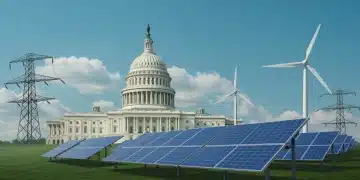EPA rolls back air-pollution standards for power plants

The EPA’s rollback of air-pollution standards for power plants increases harmful emissions, posing significant risks to public health and air quality, while prompting calls for stricter regulations and technological innovation to address these challenges.
EPA rolls back air-pollution standards for power plants, and this move has left many wondering how it will affect our environment and health. Are we truly prepared for the potential repercussions of this shift?
impact on public health and air quality
The rollback of EPA air-pollution standards is raising alarms about its impact on public health and air quality. As regulations loosen, it becomes imperative to understand the repercussions of this change on our daily lives.
Health Risks Associated with Air Pollution
Increased emissions from power plants can lead to deteriorating air quality, posing significant health risks. Exposure to polluted air is linked to a range of health issues, including:
- Respiratory diseases, such as asthma and bronchitis
- Cardiovascular problems, including heart attacks
- Increased hospital visits during high pollution days
Moreover, vulnerable populations, like children and the elderly, are particularly at risk. It’s crucial to recognize that air pollution effects are not just short-term; they can result in chronic health issues over time.
Long-term Effects on Air Quality
The long-term implications of relaxing air-pollution standards are concerning. With fewer restrictions, power plants may emit higher levels of toxic pollutants. This deterioration in air quality can lead to:
- Increased occurrences of smog and haze
- Worsening of climate change effects
- Impacts on wildlife and ecosystems
Additionally, communities situated near power plants may face disproportionate exposure to harmful pollutants. This makes understanding the sources and potential solutions even more vital. The issue is not merely environmental; it is fundamentally a public health crisis that demands attention.
economic implications for power plants

The economic implications for power plants resulting from the rollback of EPA air-pollution standards are significant and complex. As regulatory burdens lessen, many power plants may find short-term financial relief. However, this momentary gain could lead to long-term costs that impact the entire economy.
Cost Reductions and Initial Gains
With fewer pollution controls in place, power plants may experience reduced operational costs. This can result in:
- Lower capital expenditures for compliance technologies
- Increased profit margins in the short term
- Possibly lower electricity prices due to reduced production costs
However, these benefits need to be weighed against potential future liabilities. As the effects of increased pollution emerge, the financial landscape may shift dramatically.
Long-term Financial Risks
While immediate profits might be appealing, the long-term financial risks are worrisome. Exceeding pollution limits can lead to penalties and increased costs in health care due to pollution-related illnesses. Moreover, communities may demand stricter controls in response to worsening air quality. This could lead to:
- Higher costs for retrofitting plants to meet future standards
- Legal battles over health impacts
- A shift in consumer preference towards cleaner energy sources
As societal awareness of environmental issues grows, investors may also turn away from companies that do not prioritize sustainability. Transitioning to cleaner energy options can initially seem expensive, but in the long term, it is likely the more economically sound choice.
regulatory changes and their consequences
The regulatory changes coming from the EPA’s rollback of air-pollution standards can lead to significant consequences for both the environment and public health. By loosening these regulations, the agency aims to reduce the compliance burden on power plants, but the potential fallout raises serious questions.
Immediate Effects of Reduced Regulations
As power plants face fewer restrictions, immediate changes in operation can occur. This might lead to:
- Increased emissions of harmful pollutants like sulfur dioxide and nitrogen oxides
- Short-term cost savings for power plants, possibly lowering energy prices
- Higher levels of smog and poor air quality in surrounding communities
While some may see short-term gains, the overall impact on air quality can place higher stress on public health systems, especially in urban areas.
Long-term Environmental Consequences
Long-term, the consequences of relaxed regulations may turn negative. Increased emissions can exacerbate climate change and lead to:
- Greater frequency of extreme weather events
- Deterioration of natural habitats and biodiversity
- Increased health care costs associated with pollution-related illnesses
As society grapples with these challenges, the discussion around government regulations will likely intensify. Communities and activists may push for stricter environmental standards, citing the significance of maintaining air quality.
future outlook for air-pollution standards

The future outlook for air-pollution standards reflects growing concerns about health and environmental impacts. As discussions unfold about climate change and public health, it’s essential to consider how these evolving standards will shape our world.
Trends in Regulation
Expect trends that lean towards tighter regulations as awareness of air quality issues rises. This may lead to:
- Stricter limits on emissions from power plants
- Increased investments in renewable energy sources
- More robust community advocacy for cleaner air
The push for new standards may arise from both public demand and scientific findings linking pollution to severe health outcomes.
Role of Technology and Innovation
As the future unfolds, technology plays a key role in shaping air-pollution standards. Advancements in technology can lead to better monitoring of air quality and pollution sources. These innovations might include:
- Improvements in emissions control technologies
- Real-time data reporting on air quality
- Development of low-emission energy sources
Incorporating technology not only helps in compliance but also fosters public trust in the commitment to cleaner air.
The increasing role of sustainability in business practices will further pressure regulators to maintain and enhance standards. People are recognizing the importance of preserving our environment for future generations, making their voices heard through actions and policy support.
In summary, the rollback of air-pollution standards by the EPA poses a challenge for public health and the environment. As we look to the future, it’s clear that stricter regulations and innovative technologies will play a critical role in shaping cleaner air. Engaging communities and advocating for sustainable practices are essential steps in this journey. Together, we can work towards a healthier environment with lasting impacts on future generations.
FAQ – Questions about EPA’s Rollback of Air-Pollution Standards
What are the immediate effects of the EPA’s rollback on air quality?
The rollback may lead to increased emissions of harmful pollutants, resulting in poorer air quality and higher health risks for communities.
How does this change impact public health?
With higher pollution levels, vulnerable populations, such as children and the elderly, are at greater risk for respiratory and cardiovascular diseases.
What role does technology play in improving air quality standards?
Technology can facilitate better monitoring of emissions and air quality, helping regulators and communities to enforce compliance and strive for cleaner air.
What actions can communities take to address air pollution?
Communities can advocate for stricter regulations, engage in local sustainability initiatives, and support policies that promote cleaner energy sources.





